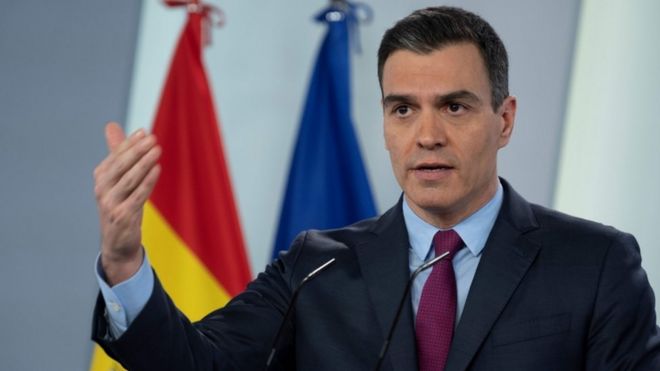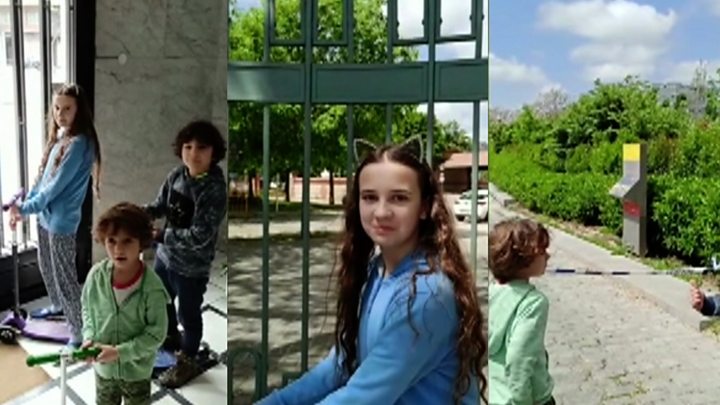Coronavirus: Spain plans return to 'new normal' by end of June
 AFP
AFP
Spain has announced a four-phase plan to lift its stringent coronavirus lockdown and return to a "new normality" by the end of June.
Prime Minister Pedro Sanchez said each region would relax restrictions at a different pace, depending on the severity of its outbreak.
Four Spanish islands will be first to ease measures from 4 May, with the rest of Spain following a week later.
Spain's coronavirus outbreak has so far killed almost 24,000 people.
The country has endured some of the world's toughest containment measures since 14 March, with children banned from going outside for six weeks.
There are signs the epidemic is now in decline, however. On Tuesday Spain's daily toll of registered virus deaths was 301, according to its health ministry, compared to a high of 950 in early April. The number of new infections also fell to 1,308 on Tuesday, its lowest level since Spain declared a state of alarm on 14 March.
On Sunday, Spanish children under the age of 14 were finally permitted to leave their homes - for one hour a day, between 09:00 and 21:00.

As of 2 May, the rest of the population will also be allowed brief outdoor exercise and walks, if the infection rate continues to fall.
How will Spain leave lockdown?
Spain has already taken an early step, allowing workers in manufacturing, construction and some services to return to work from 13 April.
On Tuesday, the prime minister outlined a fuller de-escalation plan with four phases, each expected to last about two weeks. He said the process would take a minimum of six weeks, and hopefully no more than eight.
"By the end of June, we as a country will have entered into the new normality if the epidemic remains under control," he said.
Before the plan kicks in, there will be a preparatory "phase zero" from 4-11 May, in which hairdressers and other businesses that take appointments can reopen, restaurants can offer take-away services, and professional sports leagues will go back to training.
- Can you compare different countries?
- Madrid’s medical heroes in fight of their lives
- WATCH: 'If you don't want to work like a slave, you're out'
Mr Sanchez said provinces would progress to less restrictive phases based on their infection rates, local hospital capacity, and how well distancing measures were being observed.
The government wants remote working to continue wherever possible until June, when the fourth and final phase should be imposed.
Spain had avoided setting specific deadlines for lockdown easing so it wouldn't miss them if the situation changed, the prime minister said.
What reopens when?
- Small businesses and hotels can open from 11 May, but social distancing will remain in force
- Though some schools will reopen in late May, most will stay closed until the new term begins in September, in line with a similar decision in Italy. By contrast, France unveiled plans on Tuesday to gradually resume school classes from 11 May
- Restaurants can start opening their terraces from mid-May, but they must not be more than 30% full during the first phase
- Religious services can resume on a limited basis from 11 May, at no more than one third of the building's capacity
- Theatres and cinemas will reopen from late May, but again must be no more than a third full
- Shops can open at half capacity from around the end of June, with two metres (6ft) between shoppers
- Beaches are expected to reopen in late June
Mr Sanchez told Spaniards: "We are starting to glimpse an outcome that will be a reward for the huge collective effort made over the past weeks."
But he warned that "the virus is still lurking".
"It's up to the people now, we are embarking on a journey without a precise route map. [...] What we've accomplished is enormous, but it could all be lost if we don't look after each other."
Spain's economy has been battered by the impact of the virus, and the Bank of Spain forecasts that unemployment could rise to 21.7% this year.
Mr Sanchez said a recession of "extraordinary scale" was now looming, which would require an extraordinary response from the EU.

- A SIMPLE GUIDE: How do I protect myself?
- AVOIDING CONTACT: The rules on self-isolation and exercise
- HOPE AND LOSS: Your coronavirus stories
- VACCINE: How close are we to finding one?
- TESTING: Can I get tested for coronavirus?




/product/44/303993/2.jpg?2398)











No comments
Post a Comment